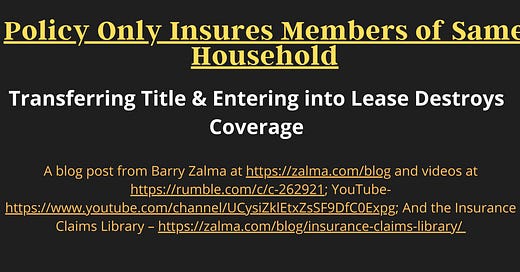Policy only Insures Members of Same Household
Transferring Title & Entering into Lease Destroys Coverage
Posted on July 5, 2021 by Barry Zalma
Insurance is a contract. It must be read and enforced as written. When title to the property changes it is incumbent on the owners to advise the insurer of the changes. Failure to do so can be very expensive and destroy coverage. After a trial court concluded that there was no coverage for a fire because the owner was not an “insured” Virginia Brenner and Amber Osmun, appealed the judgment of a trial granting summary judgment in favor of Goodville Mutual Casualty Company (“Goodville”). In Goodville Mutual Casualty Company v. Virginia C. Brenner, et al., 2021-Ohio-2252, No. WM-20-007, Court of Appeals of Ohio, Sixth District (June 30, 2021) the Court of Appeals was asked to reverse since the two plaintiffs were relatives.
FACTS
Goodville sued seeking declaratory judgment asking the trial court to declare the rights of the parties under a homeowner’s insurance policy it issued to Brenner seeking benefits after a fire. The residence coverage refers to a farmhouse while the related private structures coverage refers to a two-story detached garage structure located approximately 150 feet from the farmhouse.
The garage consisted of a first-floor storage area and a second-floor apartment. At the time of the fire, Brenner resided in the farmhouse. Osmun, Brenner’s granddaughter, resided in the apartment with her son. The fire destroyed the detached garage structure, including the storage area and the apartment, and all of their contents. The farmhouse was not damaged.
Brenner and Osmun appeared for an examination under oath regarding their respective personal property claims. In their testimony, it was revealed that Brenner had purchased insurance coverage for the property from Goodville annually since 2007 when her husband passed away. Brenner did not purchase any separate insurance coverage for the property of any renters that might occupy the apartment. Osmun likewise did not purchase any renter’s insurance for her personal property or contact Brenner’s agent to inquire about obtaining renter’s insurance when she moved into the apartment.
Both the farmhouse and the apartment share a single address. The parties agree that their intention was to ultimately transfer the entirety of the property to Osmun after she moved into the apartment. Brenner believed that she was still the owner of the property at the time of the fire. Brenner executed a quitclaim deed transferring ownership of the property to Osmun. Osmun testified that she would be taking over the mortgage on the property but that process had not yet been completed at the time of the fire.
In conjunction with that transfer, Brenner and Osmun executed a lease agreement which granted Brenner a 99-year lease to remain on the property. The lease identified Osmun as the “landlord” and Brenner as the “tenant.”
Following the examinations, Goodville filed their declaratory judgment action alleging that Osmun was not an “insured” as defined by the policy. Goodville argued that although Osmun was a relative of Brenner’s, she was not a member of Brenner’s household and, therefore, not an “insured.”
The trial court granted Goodville’s motion for summary judgment and denied appellant’s cross-motion for summary judgment. The trial court found that Osmun was not a resident of Brenner’s household under the plain meaning of those terms and, therefore, was not an “insured” as defined in the policy.
ANALYSIS
The trial court did not err in granting summary judgment in favor of Goodville.
The Policy Definition “Resident Of Your Household” Is Not Ambiguous.
It is well settled that insurance policies should be enforced in accordance with their terms as are other written contracts. Where the provisions of the policy are clear and unambiguous, courts cannot enlarge the contract by implication so as to embrace an object distinct from that originally contemplated by the parties. The court must examine the contract as whole and presume that the parties’ intent is reflected in the language used. When the policy language is clear, the court may look no further to find the intent of the parties.
In granting summary judgment, the trial court found that the term “household” was not ambiguous. The trial court cited Brenner’s testimony that Osmun was renting the apartment from her as evidence that Osmun was not residing under the same roof as Brenner and, therefore, not an insured. The term “household” as used in the Goodville policy is not ambiguous as a matter of law.
The appellate court concluded that the trial court did not err in finding that the term “household” as used in the Goodville policy was not ambiguous and that the trial court did not err in determining that the plain and ordinary meaning of “household” is limited to those residing in the same dwelling place.
Osmun Was Not A Member Of Brenner’s Household When She Resided In The Related Private Structure.
Summary judgment can only be granted when there are no material facts in dispute. A “material fact” is one which would affect the outcome of the suit under the applicable substantive law.
The disputed facts in this case were not material. Brenner testified that Osmun lived as her tenant in the apartment and paid her a monthly rent. Osmun, in turn, testified that she was the owner of the property and that Brenner was her tenant. Osmun’s testimony was supported by a signed lease agreement which identified the relationship of the parties as landlord and tenant. In either scenario, Brenner and Osmun are in a landlord and tenant relationship, not members of the same social unit.
Brenner also purchased a separate endorsement for the “Related Private Structures Rented to Others” (emphasis added). This endorsement describes which terms and exclusions from the homeowner’s policy were applicable to the “family rental.” The endorsement specifically states that the policy’s “business” exclusion did not apply to coverage for the rental property, allowing Brenner to rent the apartment without affecting the policy’s coverage for the structure itself. Put simply, Brenner and Goodville’s anticipated use of the apartment was as a rental property from which Brenner could earn income, not an extension of Brenner’s household.
In sum, there were no facts which show appellants were dwelling under the same roof or members of the same social unit comprised of those living together in the same dwelling place. Osmun was, therefore, not a member of Brenner’s household and was not an insured under the plain and ordinary terms of Brenner’s policy with Goodville. Therefore, judgment in favor of Goodville was proper.
ZALMA OPINION
Ms. Brenner and Ms. Osmun were their own worst enemies. They changed title and relationships from grandma to grand daughter while only insuring grandma as the only insured. Since grandma didn’t have an insurable interest in the garage she was not entitled to recover benefits from the policy, and since granddaughter Osmun was not an insured she could recover nothing. This problem could have been avoided by simply calling the insurance agent and changing the policy to comport with the change in ownership and the rental agreements.
© 2021 – Barry Zalma
Barry Zalma, Esq., CFE, now limits his practice to service as an insurance consultant specializing in insurance coverage, insurance claims handling, insurance bad faith and insurance fraud almost equally for insurers and policyholders. He also serves as an arbitrator or mediator for insurance related disputes. He practiced law in California for more than 44 years as an insurance coverage and claims handling lawyer and more than 52 years in the insurance business. He is available at http://www.zalma.com and zalma@zalma.com.
Mr. Zalma is the first recipient of the first annual Claims Magazine/ACE Legend Award.
Over the last 53 years Barry Zalma has dedicated his life to insurance, insurance claims and the need to defeat insurance fraud. He has created the following library of books and other materials to make it possible for insurers and their claims staff to become insurance claims professionals.
Go to the podcast Zalma On Insurance at https://anchor.fm/barry-zalma; Follow Mr. Zalma on Twitter at https://twitter.com/bzalma; Go to Barry Zalma videos at Rumble.com at https://rumble.com/c/c-262921; Go to Barry Zalma on YouTube- https://www.youtube.com/channel/UCysiZklEtxZsSF9DfC0Expg; Go to the Insurance Claims Library – https://zalma.com/blog/insurance-claims-library/ Read posts from Barry Zalma at https://parler.com/profile/Zalma/posts; and the last two issues of ZIFL at https://zalma.com/zalmas-insurance-fraud-letter-2/ podcast now available at https://podcasts.apple.com/us/podcast/zalma-on-insurance/id1509583809?uo=4






